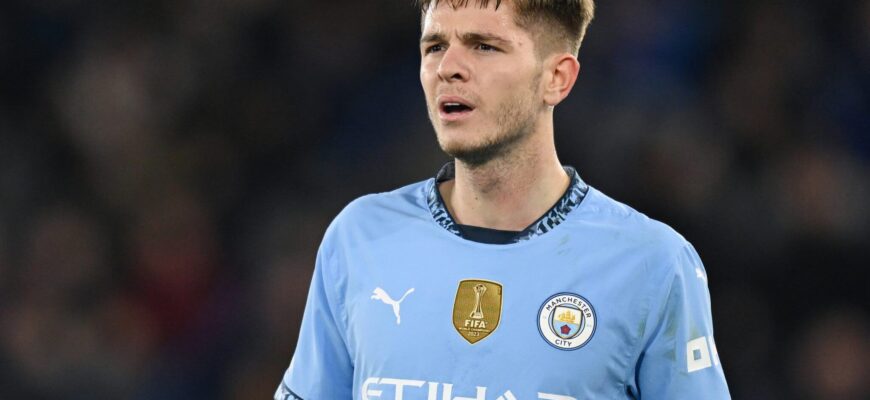In the high-stakes arena of elite football transfers, every negotiation is a delicate dance between ambition and economics. This summer, Manchester City has once again positioned itself as a shrewd negotiator, particularly concerning its burgeoning young talents. At the heart of the current discussion is James McAtee, the England Under-21 captain, whose future is now subject to a fascinating and highly strategic valuation of £35 million by his parent club.
The £35 Million Question: Setting the Benchmark
For many clubs eyeing McAtee, including Premier League hopefuls Nottingham Forest and West Ham, alongside Bundesliga giants Borussia Dortmund and Eintracht Frankfurt, City’s asking price has raised eyebrows. Initial expectations from suitors hovered around the £20 million to £25 million mark. However, City`s resolve remains firm, citing the precedent set by Cole Palmer’s £42.5 million transfer to Chelsea in 2023. The irony, of course, is that City themselves set this audacious benchmark, proving that the market dictates value, and they are masters of that particular game.
This isn`t merely about recuperating development costs; it`s a statement. It signals that Manchester City values its academy graduates not just as future first-team players, but as significant assets in a market where potential is often priced at a premium. Without resorting to football clichés, it`s a clear demonstration of fiscal fortitude in an inflated transfer landscape.
A Multi-Front Pursuit: Premier League vs. Bundesliga Appeal
The interest in McAtee is broad and varied, reflecting his versatile talent. Domestically, Nottingham Forest, bolstered by the recent £55 million sale of Anthony Elanga to Newcastle, appears to have the financial leverage. Their urgency could further increase should Morgan Gibbs-White’s future become uncertain amid interest from Tottenham. Similarly, West Ham, under new management and seeking replacements following Mohammed Kudus’ £55 million departure, sees McAtee as a prime target to bolster their midfield options.
Adding an intriguing international dimension, McAtee has reportedly spent time in Germany, visiting both Borussia Dortmund and Eintracht Frankfurt. His alleged positive impressions suggest the appeal of consistent playing minutes in a tactically astute league might outweigh the allure of domestic football, provided the financial chasm can be bridged. The Bundesliga has long been a fertile ground for young English talents seeking regular top-flight experience, a path that could appeal to a player keen on accelerated development.
Manchester City`s Broader Transfer Strategy: The Buy-Back Clause
The McAtee situation isn`t an isolated incident but rather a microcosm of Manchester City’s sophisticated approach to talent management. In a separate, yet interconnected, plotline, the club is also reportedly keen on re-signing another academy product, goalkeeper James Trafford. Trafford, who moved to Burnley for £19 million in 2023, is now valued by his current club at a formidable £40 million, having already rejected a £25 million bid from Newcastle. City holds a buy-back clause, a testament to their foresight in retaining control over promising departees.
This pursuit of Trafford underscores City’s long-term planning, particularly as uncertainties surround the futures of current senior goalkeepers Ederson and Stefan Ortega. While Ederson has dismissed links to Galatasaray, Ortega’s situation remains fluid. The potential reacquisition of Trafford, even at a higher price, demonstrates City’s willingness to invest significantly in players they`ve previously developed, highlighting a calculated and circular strategy in the transfer market.
The Paradox of Potential vs. Pathway
From a logical standpoint, Manchester City’s £35 million valuation of McAtee is undeniably strategic. When a player like Cole Palmer, with similar academy roots and potential, fetches a substantial sum, it sets a clear benchmark. For fans and club officials alike, selling McAtee for significantly less would feel like an undervaluation, especially given his leadership as England U21 captain and his undeniable technical prowess.
Yet, the reality of Manchester City’s formidable squad presents a paradox. With an midfield boasting the likes of Kevin De Bruyne, Phil Foden, and now Rodri, pathway for consistent first-team minutes remains severely limited for young talents. While Nico González and academy graduate Nico O’Reilly appear set to remain this summer despite interest, the club must weigh the immense value of keeping every promising player against the pragmatic need for players to gain experience elsewhere. It’s a delicate balance between nurturing talent within and capitalizing on their market value when immediate first-team opportunities are scarce.
Conclusion: A Summer of Strategic Moves
As the transfer window progresses, the saga of James McAtee stands as a testament to the evolving dynamics of modern football transfers. Manchester City is not just selling a player; they are making a strategic play, asserting their market position and the inherent value of their academy produce. Whether clubs ultimately meet their ambitious valuation or a compromise is reached, this high-stakes chess match highlights the intricate interplay of talent, finance, and ambition that defines the elite level of the beautiful game.









